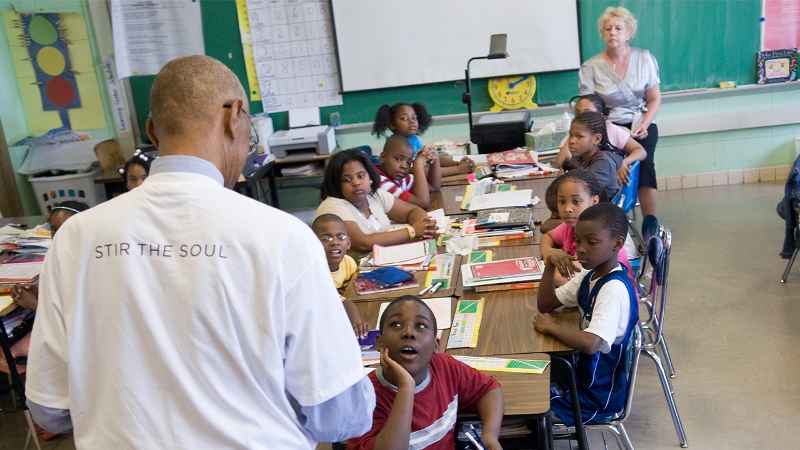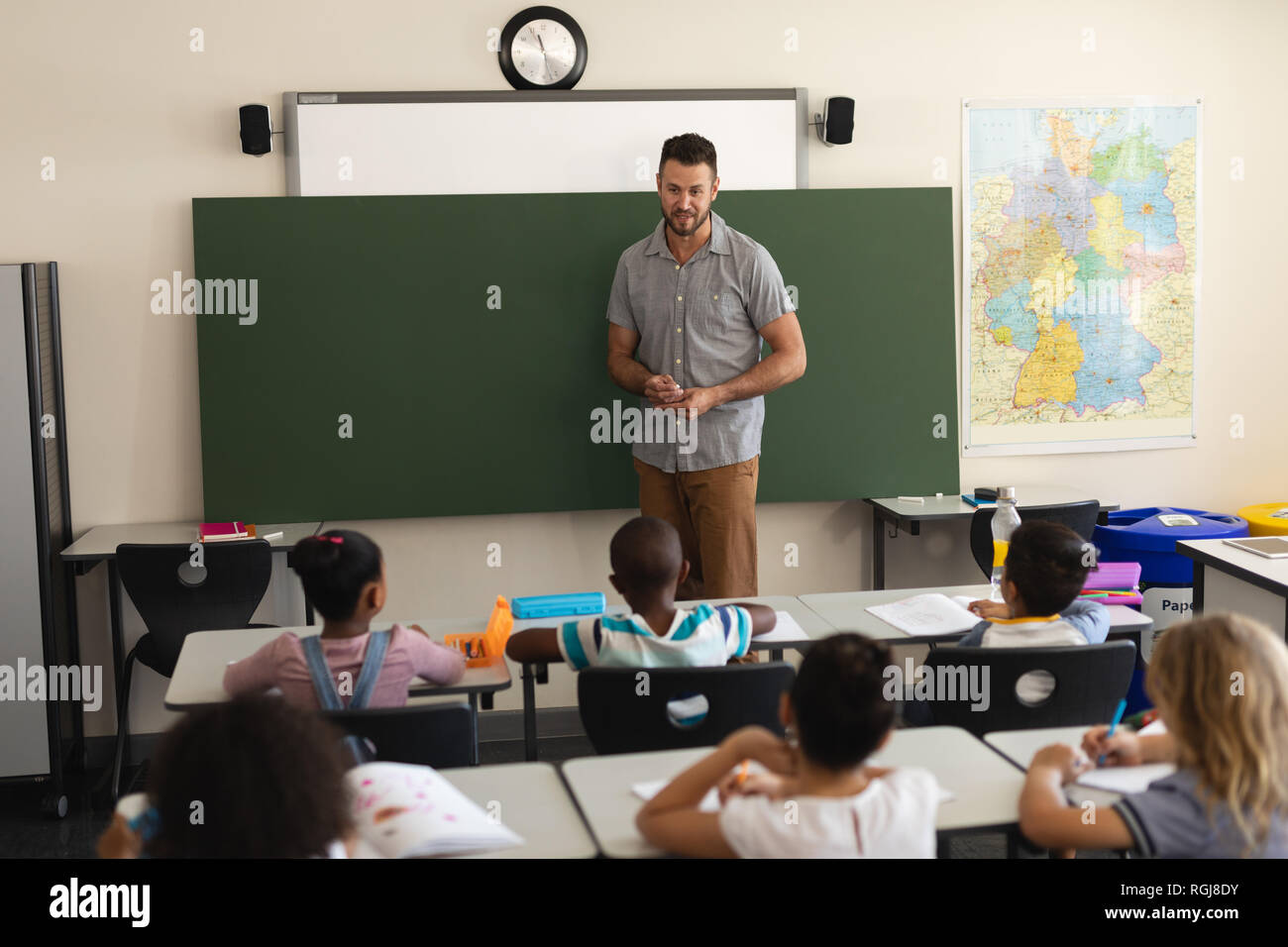Tailored Primary Science Tuition Singapore for Your Child’s Success
Tailored Primary Science Tuition Singapore for Your Child’s Success
Blog Article
Checking Out the Different Teaching Techniques in Main Science Education And Learning Today
The landscape of main scientific research education and learning is developing, with different mentor techniques acquiring prominence in modern classrooms. Inquiry-based knowing, hands-on experiments, and the combination of innovation are redefining just how educators engage young minds. Furthermore, collective strategies and differentiated direction are being used to cater to the varied demands of trainees, enhancing both involvement and understanding. As we take a look at these techniques, questions develop regarding their efficiency and the implications for future academic techniques. What might these changes in approach mean for the future generation of students?
Inquiry-Based Understanding
Inquiry-Based Knowing (IBL) is an instructional approach that urges trainees to check out scientific principles via doubting, investigation, and hands-on trial and error. This technique emphasizes the duty of students as active participants in their knowing, advertising crucial reasoning and analytical skills. By engaging with real-world inquiries, students end up being inspired and curious, which enhances their understanding of scientific concepts.
In IBL, teachers function as facilitators, guiding pupils as they navigate their queries instead of supplying details directly. This student-centered method permits differentiation, accommodating different finding out designs and speeds. Trainees create abilities in developing theories, developing experiments, and analyzing data, which are vital for scientific proficiency.
Furthermore, IBL cultivates partnership amongst pupils, motivating them to share findings and concepts. This cumulative inquiry advertises social skills and a feeling of neighborhood within the class. Furthermore, the procedure of questions encourages strength, as students find out to embrace failing as a tipping rock towards understanding.
Hands-On Experiments
Hands-on experiments are an important component of effective scientific research education and learning, matching the principles of inquiry-based knowing. These experiments permit trainees to engage straight with scientific principles, promoting a much deeper understanding through experiential discovering. By manipulating products and observing end results, young students can comprehend abstract theories in substantial means.
Such tasks advertise vital reasoning and problem-solving skills, as trainees assume end results, conduct experiments, and examine results. This process motivates them to ask concerns, refine their understanding, and establish a clinical state of mind. Furthermore, hands-on experiments can be customized to varied learning styles, guaranteeing that all pupils have the possibility to engage meaningfully with the web content.
Furthermore, hands-on experiments often motivate cooperation among peers, promoting team effort and interaction skills. Functioning in groups allows pupils to share concepts, talk about findings, and pick up from one an additional, which boosts their total educational experience.
Integrating hands-on experiments right into the primary science educational program not only improves the finding out environment yet additionally cultivates a long-lasting passion in science. By actively participating in their education, pupils are most likely to create a passion for clinical questions that prolongs past the classroom.

Innovation Integration
Integrating modern technology into primary scientific research education and learning has actually become progressively important in fostering student involvement and improving discovering outcomes. The use of electronic tools, such as interactive simulations, virtual labs, and academic software application, offers pupils with possibilities to explore scientific principles in innovative methods. These sources help with a much deeper understanding of complicated topics by permitting learners to envision and adjust variables that would be impractical in a conventional class setting.
Additionally, modern technology integration urges you can try this out customized discovering experiences. Pupils can advance at their own speed, revisiting tough ideas via multimedia resources, which deal with various knowing styles. This versatility not only sustains private development however also grows a sense of autonomy in learners.
Additionally, technology functions as a bridge to real-world scientific research, linking trainees with present study and professional contributions. Accessibility to clinical journals and online databases widens pupils' perspectives on clinical questions and fosters important believing abilities.
Collaborative Knowing
Collective learning plays an important role in key science education and learning by fostering teamwork and communication abilities amongst students. This method encourages students to work with each other, share knowledge, and participate in analytical, which improves their understanding of scientific concepts. By joining group tasks, trainees discover to verbalize their ideas, listen to varied perspectives, and negotiate solutions, all of which are necessary skills in both real-world and academic contexts.

Study suggests that collaborative discovering can bring about boosted inspiration and interaction in scientific research topics, as students locate enjoyment in shared experiences (primary science tuition Singapore). In addition, this technique prepares trainees for future collaborative endeavors, equipping them with the abilities required for reliable team effort in college and professional environments. Inevitably, embracing joint learning in key scientific research education can substantially enhance the discovering experience and promote a much deeper understanding of scientific query
Differentiated Instruction

Set apart guideline can manifest in various means, such as differing the content, processes, or items of learning. For instance, instructors might make use of tiered assignments that provide differing levels of complexity, enabling students to work at their particular preparedness levels. Furthermore, adaptable grouping strategies can promote partnership among pupils with various capacities, fostering peer knowing.
Analysis plays an important index role in this method, as it notifies direction and aids instructors understand each student's special demands. Formative evaluations, such as tests and observations, can lead teachers in changing their methods to boost learning end results. primary science tuition Singapore. Inevitably, by carrying out set apart direction in key science education and learning, teachers can cultivate a more effective and equitable discovering atmosphere, encouraging all trainees to reach their complete capacity in comprehending clinical phenomena
Verdict
In summary, the varied teaching approaches in key science education and learning, consisting of inquiry-based knowing, hands-on experiments, technology combination, collaborative learning, and distinguished instruction, jointly add to a much more efficient discovering atmosphere. These approaches promote essential thinking, problem-solving skills, and a much deeper comprehension of clinical ideas. By applying these techniques, teachers can produce engaging and encouraging classrooms that attend to the varied needs of trainees, inevitably fostering a lifelong rate of interest in science and boosting Visit Website scholastic success.
Inquiry-Based Discovering (IBL) is a pedagogical strategy that urges pupils to check out scientific ideas through questioning, investigation, and hands-on experimentation.Collective knowing plays a vital role in primary scientific research education and learning by promoting team effort and interaction abilities among trainees.Research study indicates that collective knowing can lead to increased inspiration and engagement in science topics, as pupils find satisfaction in common experiences.In promoting a comprehensive understanding setting, differentiated guideline arises as an essential technique to suit the varied requirements and capacities of pupils in key science education. Inevitably, by carrying out separated instruction in key science education, instructors can grow an extra efficient and equitable understanding environment, equipping all students to reach their full potential in recognizing scientific sensations.
Report this page